| Reviews & Columns |
|
Reviews DVD TV on DVD Blu-ray 4K UHD International DVDs In Theaters Reviews by Studio Video Games Features Collector Series DVDs Easter Egg Database Interviews DVD Talk Radio Feature Articles Columns Anime Talk DVD Savant Horror DVDs The M.O.D. Squad Art House HD Talk Silent DVD
|
DVD Talk Forum |
|
|
| Resources |
|
DVD Price Search Customer Service #'s RCE Info Links |
|
Columns
|
|
|
Doctor Who: The Complete Specials
BBC Worldwide // Unrated // February 2, 2010
List Price: $49.98 [Buy now and save at Amazon]
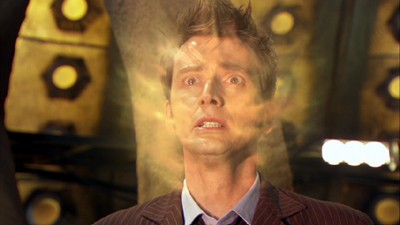 "Allons-y!"
"Allons-y!"The five "Doctor Who" specials broadcast intermittently between Christmas 2008 and New Year's 2010 had the uneniable task of following the series' enormously successful fourth season finale, which wrapped up the series' revival so wonderfully. The finale was appropriately titled "Journey's End," and it brought back all of the major players from David Tennant's years in the title role. The episode offered a grand farewell for every character and presented fans with an appropriate sense of closure.
There was just one problem: neither Tennant, producer/head writer Russell T. Davies, nor producer Julie Gardner were quite finished with the franchise. The plan was for season five - featuring Tennant's replacement, a newly regenerated Eleventh Doctor, to be played by newcomer Matt Smith and guided by incoming executive producer/head writer Stephen Moffat - to be withheld until 2010, while Tennant, Davies, and Gardner would be given a string of specials in which they could provide a changing of the guard that would acknowledge Tennant's immense popularity in the role (and allow the star to go out with a bang) while giving the show's new owners a sort of buffer, time to remake the series as they see fit.
And yet "Journey's End" was precisely the sort of epic closing chapter the Tennant years needed - and it's clear right from the start that Davies, who wrote or co-wrote all five of the specials, didn't really know where to go next. This directionlessness works well with the first episode, "The Next Doctor," as it deals mainly with the Doctor finding himself wandering the galaxy alone after having said goodbye to a rather large circle of friends.
(Oddly, while the specials - and several episodes sprinkled throughout the previous seasons - make much of the emotional impact of a companionless Doctor, these new stories never take into account the amount of time the Doctor spent in between seasons without a female at his side. Then again, unlike the classic series, which made companion changeover an art form, the new series never had a good handle on how to introduce new cast members; the Doctor's frequent "hey, wanna go for a ride?" pick-up lines seemed too much like a copout of the "well, we gotta get these gals in the TARDIS somehow" variety.)
Story-wise, "The Next Doctor" doesn't really go any further than previous Christmas specials - it's a terrific standalone episode, a nice bridge between the goodbyes of "Journey's End" and the hellos of whatever was to come, but it hardly sets up anything big. By the time the second special, "Planet of the Dead," rolled around, it became clear to fans that Davies wasn't attempting any sort of epic story arc. (Compare this to "Torchwood," which turned its five episodes for the year into an airtight single story.)
"Planet of the Dead" is, once again, just a fun standalone tale, although there are some last minute attempts at foreshadowing that feel a bit tacked on in a rush. And, by now predictably, special number three, "The Waters of Mars," is also quite solid on its own, at least until a turning point when Davies' script remembers it's supposed to lead into the grand finale, the two-part "The End of Time," which itself became a huge letdown, feeling as though Davies had painted himself into a corner with flashy-but-shallow prophecies and foreshadowing and figured the only way out was a pile of fan service. Rather than bow out in glorious fashion, Davies and his Tenth Doctor wind up tossing us a string of thin story gimmicks hastily pasted together in hopes of recapturing the magic of the season four finale. Tennant gives these episodes his all, delivering another round of tremendous performances, but they're wasted on lesser adventures. He deserves more.
(Note: Spoilers, both minor and major, are sprinkled throughout from here on in.)
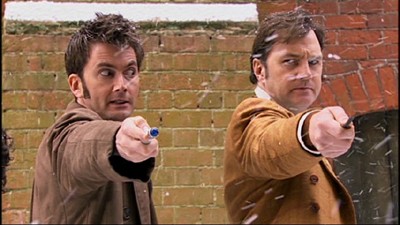 But before we get there, let's get back to "The Next Doctor." In it, the Doctor arrives in London on Christmas Eve, 1851, where he meets a rather energetic man (David Morrissey) who claims to be a future reincarnation of the Time Lord himself. It's a playful twist on fan expectations - we're entering this round of specials knowing Tennant's Doctor won't be around when they end, and when "The Next Doctor" originally aired, the identity of Doctor Number Eleven had not yet been revealed to the public. What better tease, then, than this, a nudge suggesting we might be getting a sneak preview at the Doctor Yet to Come?
But before we get there, let's get back to "The Next Doctor." In it, the Doctor arrives in London on Christmas Eve, 1851, where he meets a rather energetic man (David Morrissey) who claims to be a future reincarnation of the Time Lord himself. It's a playful twist on fan expectations - we're entering this round of specials knowing Tennant's Doctor won't be around when they end, and when "The Next Doctor" originally aired, the identity of Doctor Number Eleven had not yet been revealed to the public. What better tease, then, than this, a nudge suggesting we might be getting a sneak preview at the Doctor Yet to Come?Davies' teleplay holds out as long as it can with this tease, which is interesting, considering that most viewers can figure out pretty early on how unlikely it is that Morrissey's character is who he claims.
Would it have been a braver choice to reveal him to actually be a legitimate Doctor-to-be? Absolutely, especially for a program centered on time travel; past adventures featured multiple Doctors meeting each other, so why not have a current Doctor meet a future one, a Doctor to which we're not accustomed? Ah, but that would push the series' future producers into a continuity corner from which they'd never be able to escape. It's a case where the basic logistics of long-form televised storytelling must trump inventive risk taking.
Fortunately, what Davies concocts instead manages to work rather nicely dramatically, especially thanks to a brilliant performance from Morrissey. It turns out, predictably, that this "next Doctor" is in fact Jackson Lake, whose wife was murdered and son was kidnapped by the villainous Cybermen (whose return from apparent destruction at the end of season two is given the same casually undercooked explanation as is usually found in the classic "Who" whenever the producers decided that writing off a villain was a mistake). The script plays like a mystery, doling out clues as to Lake's true identity and the strange happenings that led him to "become" the Doctor. For the entire first act, the real Doctor is as mystified as us, which builds terrific suspense and allows for a pinch of comedy - especially once Lake's Doctor-ness is slowly stripped away and we're shown his low-tech interpretations of iconic "Who" elements like the TARDIS and the sonic screwdriver.
Morrissey's performance is divided cleanly in two: first, he's confident and brave with a hell of a baritone voice, a sort of Victorian gentleman's idea of puffed-up heroics; second, he's utterly devastated at the loss of his wife, an awakened memory that nearly paralyzes him. For the latter, we can forgive the questionable moments where the Doctor upstages him in action (most notably when Lake freezes at a chance to rescue his son, and the Doctor takes charge, swinging away like Tarzan), because while it seems like Davies is out to oversell the idea of the Doctor as the Bestest Hero Ever, we can also believe that a man in Lake's state just might shut down in key moments.
The rest of the plot is given to a bunch of (in Lake's own words) "complete and utter wonderful nonsense" about kidnapped children and a giant "CyberKing" stomping all over London and the treacheries of the icy Miss Hartigan (Dervla Kirwan). It's all hyper-paced silliness in the best "Who" mold, fun and frantic with plenty of creepiness tossed in for good measure (especially from Kirwan, who makes a terrific baddie, infusing heart into such a cold villainess).
Alas, it sort of collapses in the final act, though. Until then, the story is notably contained - busy, yes, but on a small scale. The finale, however, unleashes a Blofeldian secret lair and a hundred-foot-tall steampunk robot, which is all a bit much, really, especially when you compare it to the rather ho-hum manner in which the Doctor finally defeats his foes. (Davies himself has admitted to not liking how the story ends, a limp noodle of a climax that amounts to "oh, I have a ray gun, and now I have defeated you.") None of it is bad, just too oversized for what came before. (The final scene manages to scale back down, hinting at the Doctor's loneliness and ending on a whimsical note of Christmas, family, and friendship.)
The most questionable moment in "The Next Doctor" is in a cornball speech delivered by Lake to anyone in earshot, in which he celebrates the Doctor's single-handed victory:
"Ladies and gentlemen, I know that man! That Doctor on high! And I know that he has done this deed a thousand times. But not once - no sir, not once, not ever! - has he ever been thanked. But no more, for I say to you on this Christmas morn, bravo, sir! Bravo!"
Ever the good sport, Morrissey does his best to sell the words, but there's no real rescuing them from their own cheesiness. This is Davies giving in to his worst fanfic desires, allowing the story to slam to a halt so characters can remind us how awesome the title character is. He's done it before, most memorably at the end of season three, where an entire plot device required the entire planet (!) to cheer him on. And he does it again in the next special, "Planet of the Dead."
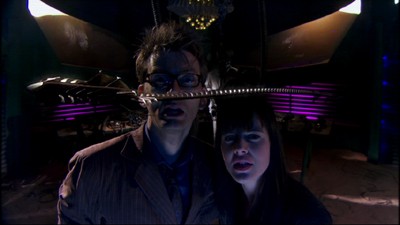 That script (co-written with Gareth Roberts, who previously penned "The Shakespeare Code" and "The Unicorn and the Wasp") deposits a fanboy character right in the middle of the action: Dr. Malcolm Taylor, played with unchecked giddiness by Lee Evans, nearly wets himself upon receiving a phone call from the Doctor and spends the remainder of the episode chatting up the Doctor's greatness. It's a bit much, which might be why Davies tones it down for the next three specials, allowing the minimal Doctor praise to be more organic.
That script (co-written with Gareth Roberts, who previously penned "The Shakespeare Code" and "The Unicorn and the Wasp") deposits a fanboy character right in the middle of the action: Dr. Malcolm Taylor, played with unchecked giddiness by Lee Evans, nearly wets himself upon receiving a phone call from the Doctor and spends the remainder of the episode chatting up the Doctor's greatness. It's a bit much, which might be why Davies tones it down for the next three specials, allowing the minimal Doctor praise to be more organic.The rest of "Planet of the Dead" is one big exercise in frivolity, which is sort of what the series needed, a buffer between the bittersweet season four finale and the increasing darkness that will fill the upcoming specials. The episode opens, so very ridiculously, with a museum heist, pulled off by the Lady Christina de Souza (Michelle Ryan), a well-to-do type who, like Thomas Crown, engages in thievery for the thrill. ("That's how I like things: extreme!" she explains, in what may be the most cringe-worthy slice of dialogue to come from the Tennant era.)
Her escape leads her to a double decker bus where the Doctor is tracking down a wormhole, through which, naturally, the bus vanishes. The passengers arrive on a desert planet, and all is not well: a spacecraft belonging to housefly-like aliens is also stranded, and with the Doctor's help, they discover the planet had been devoured by an army of stingray-like robot thingies, and it's likely the beasts have opened the wormhole to invade Earth.
The rest is a big heap of running and screaming, in the best sense. There's no denying the silliness of it all, but it's a silliness that's embraced. This is big fun, even if it is pretty darn lightweight, opting to center at least one set piece around Lady Christina's cat burglar gymnastic skills. (With Lady Christina, fans can get a glimpse at a "Who" that never was: had the original series not been cancelled in 1989, the producers had planned to make a female cat burglar the Doctor's next companion.)
With all this noise and big scale action and scaled-back continuity, one could easily imagine "Planet of the Dead" as an example of what a "Doctor Who" movie would look like. It's also quite dopey, with flaws revealing themselves in post-viewing realizations of "hey, none of that made a lick of sense!" But it's plenty fun in the moment.
But then, of course, we come to its finale, when Davies chucks in a scene that feels designed from the start to give fans something to obsess over for the remainder of Tennant's reign, as if he's suddenly J.J. Abrams, gleefully preferring to watch us sweat as we decode all the hints.
Here, the Doctor is approached by Carmen (Ellen Thomas), a side character whose psychic abilities seemed, up to this point, a trait wholly unnecessary to the plot. As the ominous music swells, she warns him:
Carmen: "Your song is ending, sir."
The Doctor: "What do you mean?"
Carmen: "It is returning. It is returning through the dark. And then Doctor, oh, but then, he will knock four times."
It's here, with these few words, that the specials begin a downward spiral. The next three episodes become a game of "gotcha!" between Davies and the audience, who will spend all their viewing time listening for clues to those four knocks. And Davies allows the Doctor himself to become obsessed with his own "death" - a sudden turnaround from how he handled such thoughts in "The Next Doctor," when he took the notion of an inescapable regeneration quite lightly.
Worse, the character spends much of the next three specials as kind of a dick and kind of a coward. He's been both before, but those were previous incarnations; Tennant's Tenth Doctor was a selfless hero, coldhearted to his enemies but full of warmth and grace to everyone else. To hear him weep "I don't want to go!" after whining endlessly at the end of "The End of Time, Part Two" is to suddenly be faced with a whole new character, one that never manages to use his dickishness or his cowardice in the service of good drama.
The "knock four times" gimmick also comes with a bit of double-edged obnoxiousness: we know it hints to the Master, who spent his season three revival connected to a four-beat rhythm that played a key role in that season's plotline, but it also hints to anyone else, since having it be the Master that foretells the Tenth Doctor's demise would be far too obvious a payoff. Davies ultimately plays it both ways, by bringing back the Master but then using someone else's four knocks at the end, winking the whole time, unaware that we could see right through the ploy three episodes ago. "Ooh, I bet you thought the Master would be the one knocking four times!" No, Russell, we never really did.
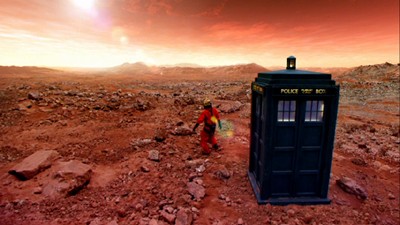 Since the Master doesn't return just yet, the third special, "The Waters of Mars," could have very well been filler, considering "Planet of the Dead" jumped the prophecy gun. Really, such a tease should've been postponed one episode, because now we're left spending the entire hour listening to the Doctor ramble about knocking four times but knowing nothing vital will actually happen just yet.
Since the Master doesn't return just yet, the third special, "The Waters of Mars," could have very well been filler, considering "Planet of the Dead" jumped the prophecy gun. Really, such a tease should've been postponed one episode, because now we're left spending the entire hour listening to the Doctor ramble about knocking four times but knowing nothing vital will actually happen just yet.Ah, but the first half of "The Waters of Mars" is such terrific storytelling that we don't mind the filler. (The troubled second half? Not so much.) Co-written with "Sarah Jane Adventures" regular Phil Ford, the episode is about as pure an "aliens attack the base" yarn as you can get. It's 2059, and the Doctor pops by Mars for a quick holiday and stumbles upon the Red Planet's first human colony. Upon hearing the date, he gets a little nervous, realizing he needs to leave - something bad is about to happen, and it's one of those "fixed points in time" that he's unable to change.
But he's also unable to leave, since he arrives just in time for the invasion of a mysterious water-based life form that can take over your body with the contact of a single drop of contaminated water. The imagery is what sells it: infected victims show massive cracks around lips stuck in a perpetual smile while menacing eyes stare curiously and a seemingly impossible amount of water pours from hands, lips, hair. As monsters go, this one's one for the nightmares.
The bulk of the story is reminiscent of such classics as "The Thing" and "Alien," with the writers and director Graeme Harper sink their teeth into all the genre's trappings: body "takeovers" seen only in out-of-focus backgrounds, too-quick monster reveals that lift you out of your seat, the dwindling resources that suggest there's no way out. "Doctor Who" hasn't offered a good old monster yarn like this in a while, and it's nice to see such tension play out so splendidly.
Around this format, the writers weave a delicious dilemma for our hero. The base's ultimate destruction is, as mentioned, a "fixed point in time," and no meddling from the Doctor can rescue it. (Never mind debates over how much interference from the Doctor constitutes "too much," or why past adventures are so inconsistent with such rules. Right now, it's all about how the rule plays out within the confines of this story.) He's faced with a hell of a problem: obey the laws of time and leave these people to die, or to hell with it all and risk humanity's entire timeline to save a few lives.
For a while, it looks like the teleplay is headed toward the braver of the two, with the Doctor walking slowly away from the people who need him. Tennant plays the moment brilliantly, allowing the horror the decision to slap him across the face. Better, the script really pours it on with the sacrifice, as it becomes clear the base's commander, Adelaide Brooke (Lindsey Duncan), is willing to allow herself and her colleagues to die in order to keep the flood from reaching Earth (and, we understand, to ensure the peaceful future inspired by her death still happens). It's an amazing moment.
It does not last. Perhaps afraid to have the Doctor lose, the script does a complete reversal, with the Doctor storming back to the base in the nick of time, setting up a fast-paced but ultimately disappointing action finale. Strangely, it's all done to set up a final scene in which the Doctor, having changed history by returning Brooke and a few others to Earth, suddenly becomes consumed with ego, declaring himself "Time Lord Victorious!" Then an Ood arrives in a vision, warning the Doctor of his ending song, and the hero sulks away, wondering what he's become.
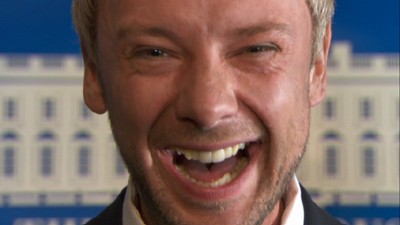 It's not that Davies allows the Doctor to become so unlikable so quickly - after all, he did bother to sprinkle hints throughout previous episodes that it's his companions that keep him grounded, and by traveling alone, he's losing grip on compassion, never knowing when his actions go too far; this is merely the payoff of those ideas. No, what makes the ending of "The Waters of Mars" such a problem is that this idea is never followed through in the next two specials, "The End of Time, Part One" and "Part Two." That's because Davies clutters his finale with too many ideas, too few of them actually working, too many disconnected, too many winding up as teases that never go anywhere.
It's not that Davies allows the Doctor to become so unlikable so quickly - after all, he did bother to sprinkle hints throughout previous episodes that it's his companions that keep him grounded, and by traveling alone, he's losing grip on compassion, never knowing when his actions go too far; this is merely the payoff of those ideas. No, what makes the ending of "The Waters of Mars" such a problem is that this idea is never followed through in the next two specials, "The End of Time, Part One" and "Part Two." That's because Davies clutters his finale with too many ideas, too few of them actually working, too many disconnected, too many winding up as teases that never go anywhere.Consider, for example, the Doctor's question to Wilfred Mott (Bernard Cribbins), spirited grandfather to former companion Donna Noble (Catherine Tate). "Who are you?" he asks reluctantly, as if realizing something of great consequence. He goes on to explain how the two have crossed paths too many times for coincidence to come into play, and he suspects something greater is at work. But Davies has played that card before: season one ends with the revelation that a super-powered Rose has spread warnings to the Doctor throughout time and space; season four ends with the revelation that a super-powered Dalek Caan manipulated space-time in order to bring Donna and the Doctor together. The latter was truly hyped leading up to that season's finale, with the Doctor quizzically wondering, in essence, "who are you?" to Donna.
Davies repeats that play here, essentially asking us to ignore the previous story arc and focus instead on this serious of seeming not-so-coincidences. We're supposed to spend the time between parts one and two oohing and aahing over possible truths behind Wilf - never mind that by this point, the whole premise has gone stale.
Oh, and then Part Two rolls around, and nothing comes of this. Wilf's just a guy. Never mind.
Sure, you can argue that Wilf was the "knock four times" part of the prophecy, and that means he was always destined to meet the Doctor, and he had to keep entering the Time Lord's life, but I'm not buying it. By all accounts, Davies tried to pull the ol' destiny routine one too many times, got distracted, and left us with a great big mess.
This scene and its failure to pay off is the least of the two-parter's problems. It looks as if Davies went two episodes too far, having completely run out of ideas. His imagination fails him in these scripts, which fall back on too many old ideas: the Master, Donna, the Ood, the Time Lords, a giant planet in the sky, and all those former cast members popping up at the end for yet another send-off.
With Davies, it's clear his first line of thought with "Who" is: "What do the fans want to see?" This is why Rose wound up smooching the Doctor's twin in "Journey's End," this is why everybody's back yet again for another round of farewells, and this is why so many new "Who" stories have revolved around the same handful of places, people, and creatures, despite a lead character whose very nature allows writers to deal with the widest possible variety of places, people, and creatures.
So for "The End of Time," it's the Master, who's not really dead despite everything that happened at the end of season three, and a batch of Time Lords, who aren't really dead despite everything that's been said for the past five years, and Donna, who doesn't really die when she remembers the Doctor despite such a perfect, melancholy ending to season four that said otherwise.
(Oh, Russell T. Davies, why didn't you have the guts to follow through and kill off Donna? Imagine how wonderfully that would've worked dramatically, fueling the Doctor's rage, underlining his recurring belief that he only brings pain to his human friends. Instead, you use the entire emotional core of the season four finale as a weak cliffhanger cop-out. She's fine! The whole gut-wrenching ending of "Journey's End" was a lie! No biggie!)
Part One is a long series of underwhelming set-ups that try to squeeze in too much. The Doctor (who apparently forgot all about the end of "The Waters of Mars" and now seems back to his old self) learns the Ood civilization has been developing at too quickly a rate, or something; a cult manages to resurrect the Master (John Simm), but not without the death of his widow, who had gone crazy, or something; many humans, but mainly Wilf, have been having nightmares about something; billionaire Joshua Naismith (David Harewood) got his hands on an "immortality gate" and needs the Master to make it work, or something; a couple of comic relief aliens are in disguise as humans and are trying to get their immortality gate back, or something; and Timothy Dalton shows up as the Time Lord President, who's trying to figure out how to not be dead since the show killed him off. Or something.
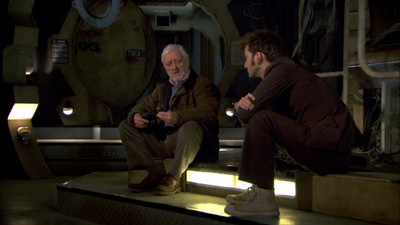 You can see Davies straining to make Tennant's farewell as monumental a television event as possible. But it's all such a jumble, and so very little of it actually works. The Master's resurrection feels like a long walk to nowhere, eventually taking us to a jokey, groan-worthy cliffhanger in which every human on Earth (minus Wilf and Donna) are turned into Master clones; this twist's resolution in Part Two is even weaker, resulting in stalled action until Timothy Dalton shows up, undoes everything, and closes that plot point before it gets any worse. (The whole "six billion Masters" thing feels less like a world-ending crisis and more like a cheap excuse to put John Simm in funny suits.)
You can see Davies straining to make Tennant's farewell as monumental a television event as possible. But it's all such a jumble, and so very little of it actually works. The Master's resurrection feels like a long walk to nowhere, eventually taking us to a jokey, groan-worthy cliffhanger in which every human on Earth (minus Wilf and Donna) are turned into Master clones; this twist's resolution in Part Two is even weaker, resulting in stalled action until Timothy Dalton shows up, undoes everything, and closes that plot point before it gets any worse. (The whole "six billion Masters" thing feels less like a world-ending crisis and more like a cheap excuse to put John Simm in funny suits.)And for all the series' efforts to lead up to this point - the "knock four times" thing, the "your song is ending" thing, the slow collapse of the Doctor's morality - there's so much here that feels tacked on as an afterthought, a sort of "oh, had I thought of that sooner, I could've worked that in to earlier episodes." Like the Joshua Naismith subplot, which is played up like a big "Vote for Saxon"-style Big Deal, never mind the fact that we've only been introduced to the guy a few minutes ago. Or the Time Lords returning, a Very Big Deal Indeed that deserves far more time that a couple scenes of Timothy Dalton yelling and Claire Bloom looking mysterious - that's stuff that could've been nicely spread out over the first couple specials. As is, it's all a blur that hurries to set itself up and hurries some more to resolve itself. It's as though Davies figured fans would be so excited to see Timothy Dalton as Rassilon that they wouldn't care if none of it added up to much of anything.
There are some very good moments indeed sprinkled throughout "The End of Time," most notably several low-key exchanges between Tennant's Doctor and Cribbins' Wilf. (Indeed, the scene where Wilf tries to convince the Doctor to take his old gun is a genuine heartbreaker.) But Davies' teleplay squanders these moments by surrounding them with a sour plot and lifeless action sequences, most bothersome being an overlong "Star Wars" rip-off with Wilf in a spaceship's gun turret, sharp-shooting incoming missiles.
And then, at long last, the Master and the Time Lords are disposed of, and we can finally get to the regeneration, which is why we came here in the first place. After all his heroics, however, the Doctor is back to being uncharacteristically cowardly, whining about having to rescue Wilf from the radiation room thingy, making a big to-do over his sacrifice. But does he regenerate yet? Nope.
In what can be viewed as a metaphor for Davies' own reluctance to step away from the franchise (or, perhaps, fans' reluctance to accept Tennant's departure), we get the Longest Regeneration Ever: the Doctor, apparently able to delay his own demise at will, goes on one last tour of the galaxy, finding the time to visit everyone he's ever met. He says it's his "reward," and a couple times, we assume he's changing history, saving the lives of former companions one last time. Other times, though, it's just a chance for the cast to take one last bow (or, in the case of the trip to the space cantina where Captain Jack is nursing his "Torchwood" wounds, a last chance to dust off every alien costume the show's ever used). Not even when we learn Martha and Mickey got married (what?) or when the Doctor sneaks back in time to see Rose before she's ever met him does this protracted finale approach the same emotional resonance as previous season enders - and after the "all together for one last bow" ending of "Journey's End," this repeat curtain call is flatly redundant, an extended gimmick that earns yawns instead of tears.
Is this how we wanted David Tennant to end his otherwise extraordinary run in the TARDIS? Going out like a chump, crying about not wanting to go, perturbed at the very notion of having to be selfless? Where's the Tenth Doctor we loved, whose bigger-than-life actions revealed a celebration of life and an unyielding urge to defend it?
Oh, well. We'll always have "Journey's End."
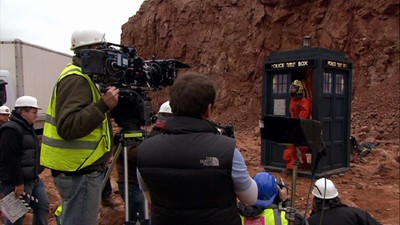 The DVD
The DVDBBC Video collects the five hour-long programs on the five-disc set "Doctor Who: The Complete Specials," with each special given its own disc. The five discs are housed in a gorgeous three-tray digipak, matching the previous "Who" season releases. Also tucked within the package is an "episode guide" booklet which features your usual chapters and extras listings, plus a rather nifty foreword by Tennant himself.
The specials have also been released individually, so fans unhappy with certain specials can pick and choose their favorites if they wish. But there's a catch: the "Complete Specials" version of "The Next Doctor" includes the full-length "Doctor Who Confidential" episode, which was not included on the single-disc release. The other specials appear to feature the same bonus material on the individual and box set editions.
Video & Audio
All five specials are presented in gorgeous 1.78:1 anamorphic widescreen transfers, helped, no doubt, by the decision to finally shoot "Who" in hi-def beginning with "Planet of the Dead." While this SD presentation isn't as grand as its HD counterpart, it's still eye-poppingly gorgeous. Everything's just right about these visuals: the impeccable detail, the crisp black levels, the vibrant colors. Absolutely fantastic.
The 5.1 Dolby soundtrack is darn solid, too. The surround mix is clever without being too show-offy, and the levels are perfectly balanced. The music and effects are just right, with a cinematic feel that never overwhelms the dialogue. Optional English subtitles are included.
Extras
As usual, this "Who" set is accompanied with an overwhelming amount of excellent bonus material.
Disc One
Few shows have devoted as much behind-the-scenes screen time as "Who." Since the show's revival in 2005, BBC Three has run "Doctor Who Confidential," an in-depth making-of series that would air immediately following every new episode of "Who." (As such, they're heavy with spoilers.) Originally thirty minutes apiece, "Confidential" expanded to forty-five for the third season. Unfortunately, none of these full-length episodes have been released on DVD; heavily edited versions (called "Confidential Cut Down") are what's included in the four season box sets. This changes here: each special's accompanying "Confidential" is being presented in its original full-length format.
And so we begin with "The Next Doctor Confidential" (55:31), which delivers the usual cast and crew interviews and on-set footage. There's plenty of time left over for studies of past Christmas specials, "Who" parodies, and the Cybermen as iconic villains, including footage from classic "Who" episodes. ("So, we meet again, Doc-tor!")
"Doctor Who at the Proms" (59:07) showcases the July 2008 Royal Albert Hall concert of Murray Gold's fabulous musical scores. More than just a symphonic performance, the evening was a full-on live experience, with monsters running through the audience, heroes (Freema Agyeman and Catherine Tate among them!) on stage narrating the story, a massive video screen playing highlights from the show's four seasons, and the mini-episode "Music of the Spheres," where the Doctor himself engages in a little panto. Wonderful!
It's terrific to see the wowed (and sometimes frightened) faces of the children in the crowd, but better still is the appreciation given to Gold, who has crafted some of the finest television music of the past decade.
(Note: this is the televised version of the Proms. The original concert, broadcast on BBC Radio 3, also featured musical works from a smattering of other composers, as a means of introducing younger fans to classical music. Those performances were edited out for television, since the TV presentation was meant to focus on Gold's music and the story of "Who.")
Disc Two
"Planet of the Dead Confidential" (56:58) is the lone extra on this disc, but it's quality over quantity here. Along with the usual interviews and story run-downs, this "Confidential" tells the tale of how a double-decker bus, camera equipment, and sandstorms don't really work well together.
Disc Three
As with Disc Two, "The Waters of Mars Confidential" (58:00) is the lone extra here, but by now you know this is not a problem. It's good to hear the crew giggle over the moldy "Who" tradition of filming in a quarry. (And is Bowie's "Life on Mars?" included here? Of course it is! And now you have the song stuck in your head. You're welcome.)
Disc Four
David Tennant, Catherine Tate, and director Euros Lyn provide a chatty commentary track. It's a shame the previous specials don't get commentaries, but the trio make up for lost time with plenty of solid talk.
"The End of Time, Part One Confidential" (57:05) has the difficult task of discussion every last inch of the finale's first half without revealing anything about the second half. It balances this problem quite well, both with the usual making-of goodies and long discussions of vintage "Who" appearances of the Time Lords and the Master (and his rubbish beard!).
I've greatly enjoyed David Tennant's previous video diaries, and this final edition, simply titled "David Tennant Video Diary - The Final Days" (40:39), is no exception. Following Tennant from his first day on "Planet of the Dead" to his last day as the Doctor. It's wildly funny, highly informative, and genuinely touching.
The two "Doctor Who BBC Christmas Idents" (0:52 total) were a lovely holiday present from the Beeb last month and are a nifty inclusion here.
Disc Five
Tennant and Lyn return for more commentary, this time joined by John Simm.
"The End of Time, Part Two Confidential" (56:56) puts the wrap on the specials. There's the making-of stuff, sure, but the real meat is in the footage of the last day of shooting and the chaotic changing of the guard. While there's some welcoming of Eleventh Doctor Matt Smith here, the bulk is spent celebrating Tennant's time in the role.
"Doctor Who at Comic-Con" (21:05) follows the cast and crew's trip to San Diego for the 2009 convention. Once you get past the glossy introductory filler, you're treated to lengthy (and highly enjoyable) Q&A footage.
Finally, Davies walks us through a string of deleted and extended scenes (17:11 total) from all five specials, explaining why they were cut. The scenes, all very solid story-wise but understandably excessive, are presented in rough cut form.
All five discs also play a promo for BBC America (the brilliant one with John Oliver narrating) as they load.
Final Thoughts
The presentation and extras are par for the course for new "Who." Unfortunately, the episodes are not. These five specials are uneven, with good material early on making way for a clumsy finale. Still, even the weaker episodes are accompanied by top rate supplemental fare. As a set, there's enough good stuff to call it Recommended.
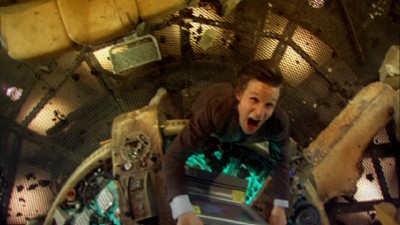
Geronimo!
|
| Popular Reviews |
| Sponsored Links |
|
|
| Sponsored Links |
|
|
| Release List | Reviews | Shop | Newsletter | Forum | DVD Giveaways | Blu-Ray | Advertise |
|
Copyright 2024 DVDTalk.com All Rights Reserved. Legal Info, Privacy Policy, Terms of Use,
Manage Preferences,
Your Privacy Choices | |||||||















